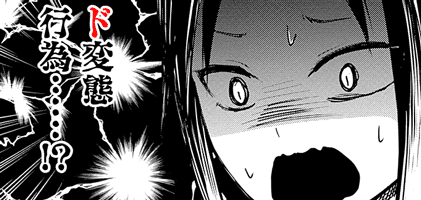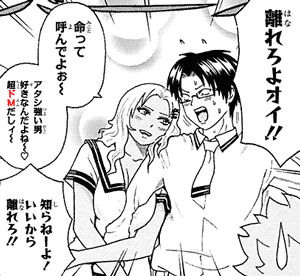For example, esu S means "sadist" in Japanese, while do-esu ドS means "super sadist." Similarly, inaka 田舎 means "countryside," while do-inaka ド田舎 would be "super countryside," "in the boondocks," and so on.
Manga: Kaguya-sama wa Kokurasetai ~Tensai-Tachi no Ren'ai Zunousen かぐや様は告らせたい~天才たちの恋愛頭脳戦~ (Chapter 13)
Meaning
The do~ ド~ prefix can be added to various word to make a more intense version of it.- do-heta
ド下手
Super badly done. Super unskilled.
You super suck at this. - do-man'naka
ド真ん中
Super center.
Right in the exact middle. - do-ureshii
ド嬉しい
Super happy.
A synonymous prefix would be chou 超.
- chou kirei
超綺麗
Super pretty.
The difference between these two prefixes is often that do ド means "very" as being a lot of something, like a concentrated variant of something, while chou 超 means "very" as surpassing an amount.
Consequently, do-man'naka is more common than chou-man'naka, while chou ureshii is more common than do-ureshii. To elaborate, you don't normally say in English "more center" or "less center," but you do say "more happy" or "less happy." The same thing applies in Japanese.
Sometimes, both prefixes are used.
Manga: Saiki Kusuo no Psi Nan 斉木楠雄のΨ難 (Chapter 163, オーラΨ(サイ)トをかいくぐれ!)
- hanarero yo oi!!
離れろよオイ!!
Let go of [me], hey!! - Mikoto tte yonde yoo~~
命って呼んでよぉ~
Call me Mikoto~~ - atashi tsuyoi otoko suki nanda yo ne~~♡
アタシ強い男好きなんだよね~~♡
I like strong men~~♡ - chou do-emu dashii~~
超ドMだしィ~~
[I] am a ultra, super masochist~~ - shiranee yo! ii kara hanarero!!
知らねーよ!いいから離れろ!!
[I don't care!] [Just] let go of [me]!!
Another word, kuso クソ, literally "shit," is also used as an intensifier, but in a negative sense, or begrudgingly.
- kuso kawaii!
クソかわいい!
It's fucking cute, damn it!
Dirty Words
For certain words, a translation with an expletive in place of do ド often makes sense, even thought do ド isn't an expletive. For example:- do-hentaiド変態
Fucking pervert. - do-S
ドS
Damn sadist. - do-M
ドM
Damn masochist. - do-sukebe
ドスケベ
LIBERTINE!!!
Manga: Kaguya-sama wa Kokurasetai ~Tensai-Tachi no Ren'ai Zunousen かぐや様は告らせたい~天才たちの恋愛頭脳戦~ (Chapter 13)
- do-hentai koui......!?
ド変態行為・・・・・・!?
A super perverted act!?
Spelling
The do ド prefix is normally written with katakana, and does not have kanji. Sometimes, it's written with hiragana instead: do-heta ど下手.弩
Although uncommon, sometimes the do ド prefix is spelled with kanji, like this: do 弩. When this happens, it's probably due to aesthetics.The meaning of the kanji is associated with bow-like weapons that sling projectiles at stuff.
- ishiyumi
弩
Crossbow. Slingshot.
According to the Pixiv dictionary, the reason why the do ド prefix is written with that kanji is a weird one.[超ド級 - dic.pixiv.net, accessed 2020-01-21]
It starts in the 20th century, when the United Kingdom came with a new kind of battleship of its Royal Navy: the "Dreadnought." Obviously, dreadnought is not a Japanese word, it's an English one (I assume), so in Japanese it ends up like this:
- doreddonooto
ドレッドノート
Dreadnought. (katakanization)
If you've ever played an online game or watched a movie that's set in space with space battles and stuff, I'm pretty sure you'll have realized already that this Dreadnought ship kind of got its name famous.
A lot of other battleships (even sci-fi spaceships) started being called Dreadnoughts, too. That's because of how impressive the Dreadnought was.
The ships that looked like the first Dreadnought got called Dreadnought in English, and in Japanese:
- doreddonooto-kyuu
ドレッドノート級
Dreadnought-class.
Of course, since technology is always moving forward, it didn't take long for "Super-Dreadnoughts" to appears, or in Japanese:
- chou-doreddonooto-kyuu
超ドレッドノート級
Super-Dreadnought-class.
Since both names are kind of long, they're normally abbreviated:
- do-kyuu
ド級
Dreadnought-class. - chou-do-kyuu
超ド級.
Super-Dreadnought-class.
In the abbreviations above, the katakana do ド sticks out like a sore thumb next to the kanji. It would be better to write the whole word with kanji, however, since do ド is the abbreviation of a loan-word, it doesn't have any kanji of its own. What do?
The solution to this was just picking a random kanji which could be read like that without caring much for the kanji's meaning, and that kanji was do 弩. So it doesn't matter a whole lot that this kanji means "crossbow" or "slingshot," because it wasn't chosen by its meaning.
With this you could write the words as:
- dokyuu
弩級
Dreadnought-class. - choudokyuu
超弩級
Super-Dreadnought-class.
Now, you may be thinking that maybe the prefix do ド we've been talking about came from the English word "Dreadnought," because do ド means "very" and Dreadnoughts were considered to be "impressive." But that would be wrong.
Literally the only relation one thing has to the other is that someone saw that dokyuu ド級 could be written as dokyuu 弩級 and figured: why not write do-esu ドS as do-esu 弩S then?!
That's just it. They are not the same thing at all. The do ド prefix even existed in Japanese words before 1900, so it's not possible that it came from the word Dreadnought of the battleships created in 1900.


No comments: